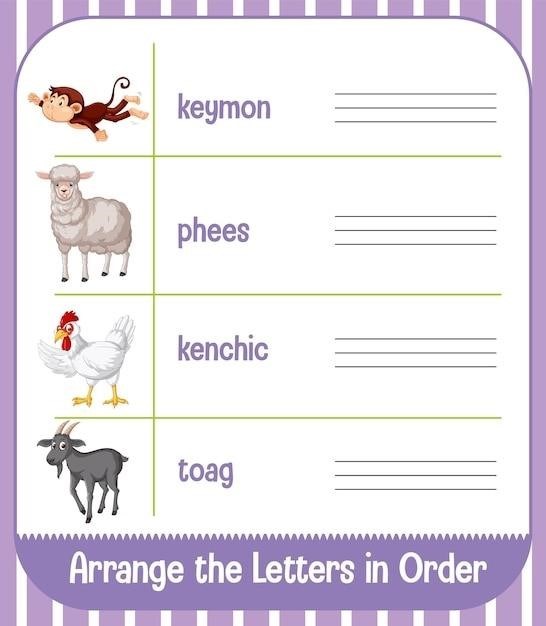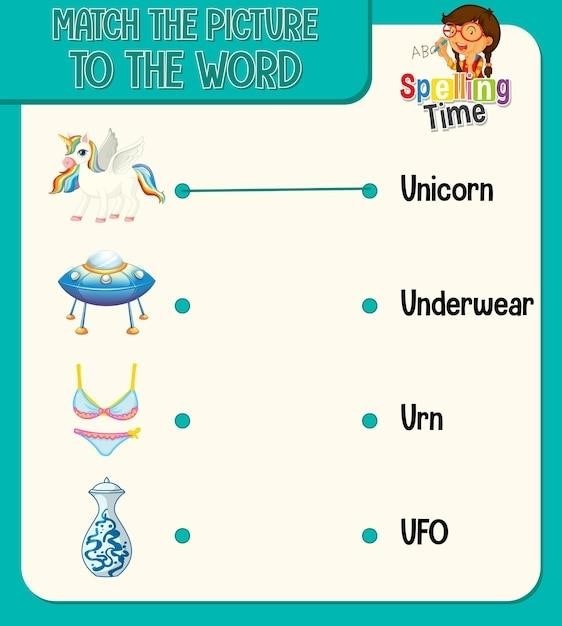3rd Grade Vocabulary Words⁚ A Comprehensive Guide
This guide provides a comprehensive overview of 3rd grade vocabulary development‚ including word lists‚ teaching strategies‚ engaging activities‚ and valuable resources. Discover effective methods to enhance your child’s vocabulary skills and support their academic success. Explore printable worksheets‚ activities‚ and online tools designed to make learning fun and engaging.
The Importance of Vocabulary Development
A strong vocabulary is fundamental for a child’s academic success and overall literacy development. In third grade‚ students are transitioning into more complex reading and writing tasks‚ requiring a broader understanding of words and their nuances. A rich vocabulary allows children to comprehend texts‚ express themselves clearly‚ and engage in meaningful conversations.
Expanding vocabulary in third grade not only enhances reading comprehension but also improves writing fluency and accuracy. Students with a strong vocabulary are better equipped to use descriptive language‚ varied sentence structures‚ and precise word choices‚ leading to more engaging and impactful writing.
Furthermore‚ vocabulary development plays a crucial role in building confidence and motivation in reading. When students encounter unfamiliar words‚ they may become frustrated and disengaged. By expanding their vocabulary‚ children can approach reading with greater confidence‚ increasing their enjoyment and engagement in the learning process.
In summary‚ investing time and effort in developing a strong vocabulary in third grade sets a solid foundation for future academic success‚ enhances communication skills‚ and fosters a love for reading.
Third Grade Vocabulary Word Lists
Third-grade vocabulary lists are carefully curated to introduce students to words they are likely to encounter in their reading materials and academic work. These lists often focus on Tier 2 vocabulary words‚ which are words that are commonly used in academic and social contexts but may not be part of a child’s everyday vocabulary.
These lists can be organized by theme‚ such as animals‚ nature‚ or science‚ or by word type‚ such as synonyms‚ antonyms‚ or homophones. Some popular third-grade vocabulary word lists include⁚
- Word Up Project⁚ This project provides comprehensive vocabulary lists for grades 2 through the SAT‚ with a focus on high-frequency words that students are likely to encounter on standardized tests.
- Flocabulary⁚ This website offers a variety of resources for vocabulary development‚ including word lists‚ games‚ and videos. Their third-grade list features common words for this grade level.
- Scholastic⁚ Scholastic provides printable vocabulary worksheets and lesson plans that cover a wide range of topics and word types.
When selecting a vocabulary list‚ consider the specific needs of your students and the curriculum they are using. Look for lists that are age-appropriate‚ engaging‚ and provide a variety of learning opportunities.
Strategies for Teaching Vocabulary
Teaching vocabulary effectively involves a variety of strategies that go beyond simply memorizing definitions. Here are some proven methods to enhance vocabulary learning in third grade⁚
- Context Clues⁚ Encourage students to use context clues within a sentence or passage to infer the meaning of unfamiliar words; This helps them develop critical thinking skills and promotes independent learning.
- Word Walls⁚ Create a dedicated word wall in the classroom where new vocabulary words are displayed with their definitions and visual representations. This provides a constant reference point for students and reinforces learning.
- Word Sort Activities⁚ Engage students in word sort activities where they categorize words based on different criteria‚ such as parts of speech‚ synonyms‚ or antonyms. This promotes deeper understanding and encourages active learning.
- Games and Activities⁚ Incorporate fun and engaging games and activities into vocabulary instruction. This can include vocabulary bingo‚ word searches‚ or matching games.
- Repeated Exposure⁚ Encourage students to encounter new vocabulary words in multiple contexts‚ such as reading‚ writing‚ and conversation. This repeated exposure reinforces learning and helps students develop a deeper understanding of the words.
By employing a combination of these strategies‚ teachers can create a stimulating and engaging learning environment that fosters vocabulary development and empowers students to become confident and effective communicators.

Engaging Activities for Vocabulary Practice
Making vocabulary practice enjoyable is key to keeping third graders motivated and engaged. Here are some fun and interactive activities you can implement in your classroom⁚
- Vocabulary Charades⁚ Have students act out vocabulary words for their classmates to guess. This encourages creative thinking and promotes understanding of word meanings.
- Vocabulary Bingo⁚ Create bingo cards with vocabulary words. Call out definitions or provide clues‚ and students mark off the corresponding words on their cards. The first student to get a bingo wins!
- Vocabulary Relay Races⁚ Divide the class into teams and have them race to complete vocabulary-related tasks‚ such as writing sentences using target words or matching words with their definitions.
- Vocabulary Pictionary⁚ Similar to charades‚ students can draw vocabulary words for their classmates to guess. This activity helps visualize word meanings and enhances understanding.
- Vocabulary Story Writing⁚ Encourage students to create short stories using as many vocabulary words as possible. This promotes creative writing and helps students apply their newfound vocabulary in a meaningful context.
By incorporating these engaging activities into your vocabulary instruction‚ you can transform learning from a chore into a fun and rewarding experience for your third graders. Remember‚ the more enjoyable the practice‚ the more likely students are to retain and utilize their new vocabulary.
Resources for Third Grade Vocabulary
A wealth of resources is available to support third-grade vocabulary development‚ both online and offline. Here are some valuable options to explore⁚
- Online Vocabulary Games and Activities⁚ Websites like K5 Learning‚ Flocabulary‚ and Sylvan Learning offer interactive games‚ flashcards‚ and exercises specifically designed for third-grade vocabulary. These resources provide engaging practice and make learning fun.
- Printable Worksheets and Activities⁚ Many websites‚ including Scholastic and Education.com‚ offer free printable worksheets covering various vocabulary skills‚ such as word meanings‚ synonyms‚ antonyms‚ and sentence construction. These worksheets can be used for independent practice or as part of classroom activities.
- Vocabulary Word Lists and Dictionaries⁚ Several resources provide comprehensive third-grade vocabulary word lists‚ including those aligned with common core standards. These lists can be used as a guide for selecting words to teach and practice. Online dictionaries and thesauruses are also invaluable tools for students to look up unfamiliar words and explore their meanings and synonyms.
- Reading Materials⁚ Encourage students to read widely‚ both fiction and nonfiction. Exposing them to a variety of texts helps them encounter new vocabulary words in context‚ which aids in comprehension and retention.
By utilizing these resources‚ you can create a rich and engaging learning environment that fosters vocabulary growth and empowers third graders to become confident readers and writers. Remember‚ consistent exposure to new words is key to building a strong vocabulary foundation.
Free Printable Worksheets and Activities
A treasure trove of free printable worksheets and activities awaits to help you reinforce third-grade vocabulary. These resources can be downloaded and printed for use in the classroom or at home‚ providing engaging ways to practice and solidify word knowledge.
- Word Lists and Definitions⁚ Numerous websites offer printable word lists tailored for third graders‚ often accompanied by definitions and example sentences. These lists can be used for vocabulary building‚ spelling practice‚ or as a basis for games and activities.
- Vocabulary Puzzles and Games⁚ Printable word searches‚ crosswords‚ and matching games are excellent ways to make vocabulary practice enjoyable. These puzzles challenge students to think critically about word meanings and relationships‚ while simultaneously reinforcing spelling and recognition.
- Sentence Completion Activities⁚ Printable worksheets with sentence completion exercises allow students to practice using vocabulary words in context. They can choose the appropriate word to complete a sentence‚ demonstrating their understanding of its meaning and usage;
- Synonym and Antonym Worksheets⁚ Worksheets focusing on synonyms and antonyms provide opportunities for students to explore the nuances of word meanings and expand their vocabulary. They can match words with their synonyms or antonyms‚ or identify the correct synonym or antonym for a given word.
These free printable resources provide a valuable tool to supplement your vocabulary instruction and make learning engaging and interactive for third graders.
Conclusion
Building a strong vocabulary is fundamental for third graders’ academic success and overall literacy development. By incorporating these strategies‚ resources‚ and activities into your teaching or home learning environment‚ you can effectively enhance your child’s vocabulary skills and equip them with the tools to succeed in their reading‚ writing‚ and communication.
Remember‚ vocabulary development is a continuous process. Encourage a love of reading‚ expose children to diverse vocabulary‚ and make learning engaging and fun. Through consistent effort and creative approaches‚ you can foster a robust vocabulary foundation that will serve your child well throughout their educational journey.
Don’t hesitate to explore the wealth of resources available online and in your community. Utilize these tools and strategies to create a positive and enriching vocabulary learning experience for your third grader‚ empowering them to confidently navigate the world of words.
References
The information presented in this article is based on various sources‚ including online resources and educational materials. While every effort has been made to ensure accuracy‚ it is important to consult with reputable educational experts and resources for the most up-to-date information and guidance.
Here are some examples of resources that were referenced in the creation of this article⁚
- Scholastic.com⁚ Offers a wide range of educational resources for teachers and parents‚ including printable worksheets and lesson plans for 3rd grade vocabulary development.
- K5 Learning⁚ Provides free worksheets‚ flashcards‚ and workbooks for students in kindergarten to 5th grade‚ including vocabulary exercises.
- Flocabulary.com⁚ Offers engaging and interactive learning experiences for students‚ including a list of common words for 3rd graders.
In addition to these specific resources‚ it is always advisable to consult with teachers‚ school administrators‚ and educational professionals to obtain personalized recommendations and support for your child’s vocabulary development.

About the Author
The author of this comprehensive guide on 3rd grade vocabulary words is a passionate advocate for early literacy and educational development. With a deep understanding of the importance of vocabulary building in a child’s academic journey‚ they strive to provide parents‚ educators‚ and students with valuable resources and insights.
Driven by a commitment to making learning accessible and engaging‚ the author has meticulously researched and curated a collection of effective strategies‚ activities‚ and resources to support vocabulary growth in 3rd graders. Their goal is to empower students to become confident and proficient readers‚ writers‚ and communicators.
The author believes that vocabulary development is a fundamental skill that lays the foundation for lifelong learning. They are dedicated to helping students unlock the power of language and embrace the joy of reading and writing.

